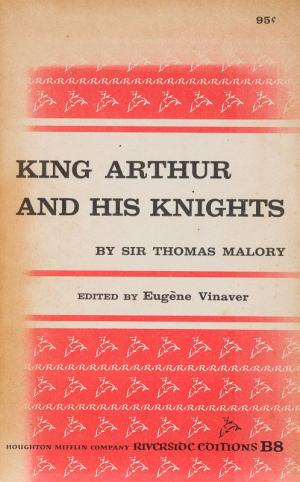King Arthur and his Knights by Sir Thomas Malory (Book Review)

The tales of King Arthur and his legendary knights seem to show undiminished merit for every new generation of readers. For the English Romantics, the medieval period was one in which the human heart and spirit were free to pursue their noble purposes unencumbered by the dreariness of modern commercial life. To the Victorians, King Arthur represented the pinnacle of English good governance. Indeed the British Raj was thought to be a modern incarnation of the Round Table. Depictions of King Arthur remain common in modern cinema and literature, and include such novel re-imaginings of Arthur as a sort of witty Cockney Gangster of the type we are used to seeing in a Guy Ritchie film.
The first publication of the Arthurian Romances in English occurred in 1485 after William Caxton published a volume of stories entitled Le Morte Darthur itself written by Thomas Malory – a knight who apparently composed most of the work while in prison. Little is known about Malory the man, but his convincing translation and interpretation of the Arthurian Romances, which would have been written in French at the time, suggests a quixotic character to whom we owe the enduring appeal of these stories.
The editor of this collection, Eugene Vinaver, has done a good job to preserve the original text of Malory whilst updating the spelling to be understandable to a modern audience (waves rather than wawes for example) as well as adding footnotes for words no longer in use (paynims are pagans for example) while also holding onto to some archaic words if there is sufficient context that a well-educated reader could pick up on their meaning (dole == sorrow). A total of nine stories are to be found in this text including the well known ones such as Merlin and The Death of King Arthur as well as other ones I was not familiar with before reading this book such as Pelleas and Ettard.
Despite the enduring appeal of the Arthurian romances, there are many aspects to which a modern audience will find strange and almost alien. While no one struggles to empathize with the sinister intentions of Iago, the crazed jealousy of Othello, and the bewilderment of Desdemona, I rarely found myself in sympathy with Lancelot, Arthur, or Guinevere. As everyone knows, Queen Guinevere is unfaithful to King Arthur with Sir Lancelot; a fact known to all the other knights of the Round Table except for King Arthur. Despite the impossibility of their public expression of love, the Queen is often sent into a spasm of despair and anger upon hearing that Lancelot may have another interest beside herself (which he never does). That jealousy can be asymmetric and hypocritical is of course not unheard of, but I neither feel convinced of the Queen’s reasons for her unreasonableness nor for Lancelot’s continued interest in her, nor for that matter the naivety of the King, who despite being an excellent administrator and leader is totally oblivious to the falsehood of his most trusted knight.
Actually the deception of Sir Lancelot is especially disturbing as he is, in public at any rate, unequivocally adamant to his honour and innocence when charges are laid against him for adultery as he is on insisting to his honour for other domains. Put another way, how can we trust his claims or courage and other chivalric duties if he fails in this one of highest importance? The morality of the era is generally puzzling. On the one hand the life of both knights and peasants seems cheap given how often they are slain. One easily loses count of the number of knights that Sir Lancelot has killed throughout these stories either by design or by miscalculation. The latter includes Sir Gareth and Sir Gaheris, brothers of Sir Gawain which end up leading to a split between Lancelot and Arthur and concomitantly a series of battles across multiple countries. Lancelot will also coolly slay peasants that do not comply with commands.
Or consider the story of The Knight with the Two Swords, in which Sir Balin deals quick “justice” to the Lady of the Lake:
So when Balin was ready to depart, he saw the Lady of the Lake which by her means had slain his mother; and he had sought her three year before. And when it was told him how she had asked his head of King Arthur, he went straight to her and said, “Evil be ye found: you would have mine head, and therefore ye shall lose yours!” And with his sword lightly he smote off her head before King Arthur.
A gentleman indeed. More generally justice in the medieval era is not so much characterized by the truth of the situation, but rather whether the accusing party is able to slay the accused in hand-to-hand combat. Sir Lancelot’s unparalleled fighting skills prevent him for ever actually answering for his crimes as he slices and dices his way through his calumniators. Despite what we imagine to be a knight’s obligation to behave “honourably” towards women, the laxity of this commitment is often seen throughout the different tales. Consider this evocative introduction to The Knight of the Cart:
And thus it passed on from Candlemas until after Easter, that the month of May was come, when every lusty heart beginneth to blossom and to burgeon. For, like as trees and herbs burgeoneth and flourisheth in May, in like wise every lusty heart that is any manner of lover springeth, burgeoneth, buddeth and flourisheth in lusty deeds. For it giveth unto all lovers courage, that lusty month of May, in some thing to constrain him to some manner of thing, more than in any other month for diverse causes: for then all herbs and trees reneweth a man and woman, and I like wise lovers calleth to their mind old gentleness and old service, and many kind deeds that was forgotten by negligence.
Despite these highlighted oddities and archaic grammar the stories were nevertheless fun to read. Being transported to a time when a knight’s duties were focused on jousting or slaying lippy peasants, while absurd on one level, is a cathartic means of escapist literature. In this sense I find myself most aligned with the Romantic’s view of the medieval era. The elements of drama that are so eternally compelling in everything from theatre to soap opera: fighting, constrained romances, highly rigid class expectations, are all to be found in this period. Objectively it was a horrible time to live and the morality of the era is appalling. The heinous crimes we see committed in the name of family honour or tribal duty, for example, stem from this more ancient time. Yet even today we still wish that was some code of honour to which people were to bound, and to be called a gentleman or a lady is usually received as a complement. While the chivalric ideals found in King Arthur and His Knights do not seem attractive to a modern reader, our society’s desire for a constitution of behaviour that would define an honourable set of behaviours towards our fellow humans remains a persistent desire.
